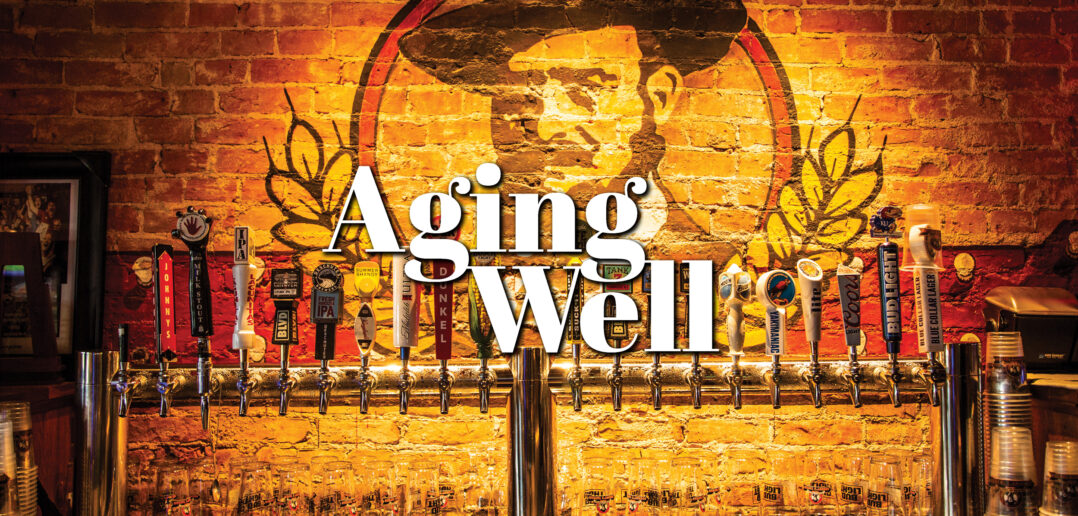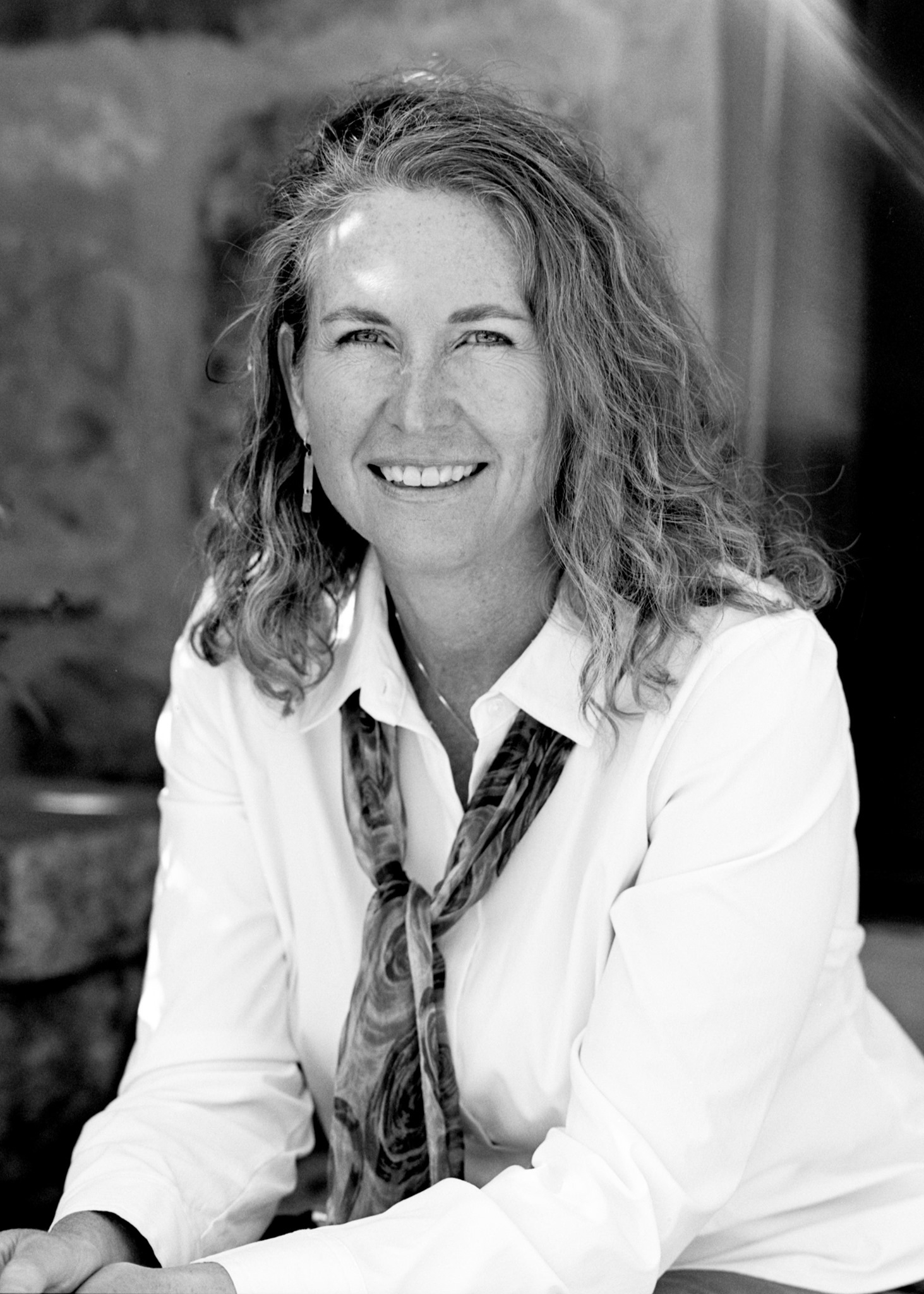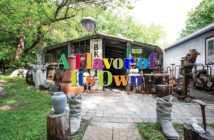| story by | |
| photos by | Steven Hertzog |
| OPEN A PDF OF THE ARTICLE |
These four iconic Lawrence watering holes weathered a legislative storm 35 years, landing them in a good economic position today.

Tap beers at Johnny’s Tavern in North Lawrence
When Rick Renfro bought Johnny’s Tavern in 1978, he didn’t see the need to change much. College kids still flocked to the North Lawrence bar to quaff beer and have fun, just as they had for decades. Then Kansas bumped its legal drinking age up to 21 in 1985, forcing Renfro and other business owners to rethink their party plans.
“That moment’s seared into my brain,” Renfro says of the law, which the Kansas Legislature phased in over three years. “That was my whole business model—college kids between 18 and 21.”
It wasn’t the only law to change around that time. Farm wineries and microbreweries were legalized, giving rise to businesses like Free State Brewing Company. Liquor-by-the-drink got a thumbs-up, but the state later banned smoking inside public spaces. The changes proved painful for Lawrence bars, but mainstays such as Johnny’s, The Wheel and West Coast Saloon persevered while creating jobs, generating tax revenue and adding to the city’s unique character.
“I think it’s more than the money and the jobs, and the economic side of things that these places bring,” Renfro says. “They bring a personality to Lawrence. They’re all diverse, and you can count on them.”
A Dry History

Rick Renfro at Johnny’s Tavern in North Lawrence
John Wilson opened Johnny’s in 1953 at the corner of North Second and Locust streets, so next year will be its 70th in continuous operation in the same location. Renfro bought it from Wilson at a time when anyone over the age of 18 could come in and order 3.2% beer. Why just 3.2 beer? The answer lies in the state’s dry history.
In 1880, Kansas became the first state to prohibit the sale of alcohol. It followed up in 1917 by outlawing even the possession of it, according to a Kansas Department of Revenue history of the state’s liquor laws. Prohibition went national in 1920 with the implementation of the 18th Amendment to the U.S. Constitution but was repealed by the 21st Amendment in 1933. Kansas, however, didn’t relax its laws until 1937. That’s when the state allowed adults over the age of 18 to purchase cereal malt beverages (CMB) that were 3.2% alcohol by weight (as opposed to the alcohol by volume metric used now).
Debates about how to tax and regulate alcohol remained contentious over subsequent decades, and enforcement was problematic. Gradually, the statutes evolved: Packaged liquor sales were allowed in 1948 (but the open saloon “forever prohibited”). The Liquor Control Act passed a year later, establishing a system of regulating, licensing and taxing package sales, and setting the drinking age at 21 for anything stronger than 3.2 beer. Private clubs were established in 1965, allowing people to drink on the premises but only after applying for a membership and paying a fee. Private club rules were tweaked in 1979, but just ordering a drink at a bar or restaurant the way folks do now? Still illegal.
Then came the ’80s. Societal concern about impaired driving was growing, and Mothers Against Drunk Driving (MADD) was lobbying for change. Congress in 1984 approved the National Minimum Drinking Age Act, which required states to raise the minimum age for purchasing or possessing alcohol to 21. States that didn’t comply would lose federal highway funds. So Kansas complied in 1985. (Interestingly, the state also voted to allow happy hours that same year.)
In 1986, Kansas voters approved a constitutional amendment enabling sales of liquor-by-the-drink, which meant bars and restaurants could, for the first time since 1880, legally sell liquor to the public. Counties then voted on whether to adopt the measure and whether to tie liquor sales to food sales. That yielded a patchwork of laws across the state. As of 2021, Douglas County and 38 others allow liquor-by-the-drink with no minimum food sales requirement (although cities can still impose their own). Sixty-three counties allow liquor-by-the-drink but only in establishments that generate 30% of their gross sales from food. Three still prohibit it entirely.
Surviving 21 at Johnny’s
Businesses could hold onto their 3.2% beer licenses and private clubs, but why bother? That was Renfro’s thinking when he combined his downstairs beer bar and separate upstairs private club into a single entity after the shift. But that didn’t solve his main problem: Johnny’s lost three-quarters of its business and 50% of its revenue after the drinking age went to 21.
“That was far and away the biggest game-changer,” Renfro says.
Renfro installed a kitchen and began serving lunch and dinner to attract more customers, and food now accounts for more than 70% of sales. He also began expanding in 1992; there are now a dozen Johnny’s locations in Lawrence, Topeka and the Kansas City metro area. The company is a closed corporation with 15 members, each of whom own varying percentages of the taverns—except for the original North Lawrence location. Renfro owned 100% of that one until recently selling 10% to his son, Spencer Renfro. That doesn’t mean Rick Renfro is going anywhere, though.
“I mainly stay here because I enjoy it,” he says. “There’s a sense of community with the building, the local people, the staff and customers. I feel like a caretaker. I can’t just walk away from it.”

Rob “Knobbie” Farha in front of The Wheel; Photo from March, 1987, with John “Dr. Woo” Wooden (in center) and a young “Knobbie” (bottom right)
The Legacy of The Wheel
Rob “Knobbie” Farha oversees a similar legacy at The Wheel, on 14th Street at the edge of the University of Kansas. Jim Large opened what was then called The Wagon Wheel Café in 1955 and sold it to John “Dr. Woo” Wooden in the 1960s. When Wooden died in 1997, Farha bought it (Wooden’s daughter still owns the building). What does continuing an institution that Kansas Alumni magazine once listed among “Mount Oread’s hallowed sites” mean to him?
“The world,” Farha says simply.
Not that it’s been easy. Money was tight when Farha quit his job as a customer service representative at American Century Mutual Funds in Kansas City to take over The Wheel. He needed to establish local residency in order to apply for a liquor license but couldn’t find a place to live, so he moved into his accountant’s basement. Wooden’s widow had to help finance his first inventory purchases. Still, The Wheel was exactly where he wanted to be.
“I came up so often to watch football games or have breakfast with Woo” after graduating from KU in 1989, says Farha, who considered Wooden a mentor and confidant. “I didn’t miss a beat.”
Farha knew how precarious the bar business could be, especially when it depended so heavily on college students. He was working at The Wheel when the drinking age went to 21 and saw business drop by half. The bar survived mostly because of the fans who flocked there after the KU men’s basketball team won the national championship in 1988, he says.
It’s perfectly positioned to benefit from such celebrations—when the team won this year’s championship, crowds flowed past on their way from Allen Fieldhouse to Massachusetts Street. Even on regular weekends, The Wheel’s walkability gives students a responsible choice when they want to meet friends for drinks. Farha says his staff “cards hard” to keep the clientele over 21 and regularly welcomes visiting alumni.
The bar has returned to full capacity now that COVID rates in the county have dropped, and it’s open six days a week when KU is in session. Farha scales back to just Friday and Saturday evenings when it’s not. Burgers, chicken tenders and chicken sandwiches feature on the lunch menu, and the Wheel Pizza Co. downstairs fills people up at night. Events like fraternity and sorority parent weekends and homecoming parties have again picked up.
“We’re almost back to a lot of the traditions and routines we had before (COVID),” Farha says.

Shaun Trenholm, co-owner of West Coast Saloon and part owner of S&S Artisan Pub & Coffeehouse.; The original sand box at The West Coast Saloon
Finding Tradition at West Coast Saloon
When it comes to Lawrence’s iconic bars, those traditions often intersect. Take the 41-year-old West Coast Saloon, which was conceived while owner Shaun Trenholm, Jim Groninger and Kendall Smith were sipping beer at Johnny’s.
“One of the guys looked around and said, ‘Oh man, we could do this,’ ” Trenholm recalls.
They scraped together $8,000 to buy another local bar. When the deal fell through, they leased a property near the intersection of Iowa and 23rd streets, hauled lumber there in Trenholm’s Datsun hatchback and proceeded to build one. The framing hammers they bought (they were cheaper than claw hammers) left waffle prints in the bar top, and they had to add a platform under the barstools because they’d built it too high. Four tons of sand and a boardwalk added a “West Coast vibe,” but Trenholm removed that after spending the next two years raking cigarette butts out of the sand.
“It was all harder than we realized, but we were so young and dumb,” Trenholm says with a smile.
Trenholm and his partners opened the bar in 1981, and he bought Groninger and Smith out a year later. The West Coast Saloon weathered the drinking age update in part because it had evolved into more of a local bar. Trenholm added a kitchen, bought a used grill from The Wheel (he calls Wooden his unofficial mentor) and began selling burgers. Not just any burgers, though. He wanted them to be as good as the ones at Johnny’s, made with one-third pound lean Angus beef on a grill that’s angled toward the door so customers would smell the aroma as they walked in.
“I thought, ‘Everybody’s got ice cold beer.’ The only thing we could really promote was burgers, so we went for it,” says Trenholm, who recently retired as a physical education teacher at Woodlawn Elementary School. (A school, he notes, that has long enjoyed strong support from Rick Renfro and Johnny’s.)
Bob Gruenwald became a partner in West Coast Saloon in 1988; managing partner Dave Dick bought in in 2004. That July, Lawrence banned indoor smoking in public spaces. West Coast Saloon’s business dropped 25% the following day.
“It was horrible. I asked Dave, ‘Do you want your money back?’ ” Trenholm says. “People were protesting by not coming in.”
Dick demurred. The partners added a patio where customers could smoke, and then the Kansas Indoor Clean Air Act went into effect in July 2010. The combination “took the sting out of it, and business came back, but those were a couple of lean years,” says Trenholm, who’s also involved with S&S Artisan Pub and Coffeehouse (set to reopen early this summer) and Booster Print & Embroidery.

Looking down at the bar from the second floor of the Free State Brewery; Outdoor patio dining.
Good News for Wine and Craft Beer
Raising the drinking age to 21 and implementing an indoor smoking ban achieved their goals—the Centers for Disease Control and Prevention says the first reduces motor vehicle crashes by 16%, and the second improves community health—but they were undeniably hard on local bars. Other changes to state laws in the 1980s had a more positive effect.
Kansas legalized farm wineries in the early 1980s, paving the way for the six in Douglas County that are registered with the U.S. Department of the Treasury’s Alcohol and Tobacco Tax and Trade Bureau, as well as for Crescent Moon Winery, a Leavenworth County winery that last year opened a tasting room in downtown Lawrence.
The state followed by legalizing microbreweries in 1987, largely thanks to the efforts of Chuck Magerl, the founder and proprietor of Free State Brewing. Magerl helped craft the legislation and lobbied for its passage with the help of leaders like Sen. Wint Winter Jr., of Lawrence.
Magerl opened Free State Brewery in 1989, selling just three beers to an eager public: Ad Astra Ale, Wheat State Golden and what he calls a hybrid version of a German Bock beer.
“It was a giddy response,” he says. “When we opened the door, there was a line of people waiting to get in.”
The timing was right. Home brewing was on the rise in the 1970s, and San Francisco’s Anchor Steam had staged a resurgence by the 1980s. A handful of microbreweries and brewpubs popped up over the next decade, then the floodgates opened. By 2021, the country’s 9,247 small, independent brewers (including 66 in Kansas) accounted for more than 13% of the overall beer market, according to the Brewers Association.
Free State initially focused on selling beer at the restaurant, where food has consistently accounted for about two-thirds of sales. An early collaboration with locally owned Grandstand Glassware and Apparel led to branded growlers customers could get filled to go; Free State now distributes beer throughout Kansas and in parts of Missouri.
The business includes its 6,000-square-foot restaurant on Massachusetts Street and a 20,000-square-foot production facility in East Lawrence. The two locations combined have about 100 full- and part-time employees. Is Magerl surprised by that?
“It was beyond my initial imagination of a small pub location,” he says.
Magerl notes growth hasn’t come without challenges. COVID, of course, followed by supply chain shortages and inflation. But his decades of business experience lends itself to pragmatism.
“I’ve been around long enough that I was involved in management of businesses in the late ’70s, when inflation was previously at this point,” Magerl says. “It doesn’t come as a visceral shock to me, because I’ve experienced it. At the same time, it’s not easy to manage.”
Boosting Lawrence’s Bottom Line
Managing such challenges is essential not only to the survival of individual businesses but also to the city’s fiscal health. Liquor taxes alone are expected to generate $2.45 million in revenue during the current fiscal year, according to the 2022 City of Lawrence budget. That doesn’t include property, sales and other taxes these bars pay to the city, county and state, or the economic impact of the jobs they create.
Food service—which includes everything from cooks and dishwashers to servers, bartenders and baristas in all types of food venues—employs 5,390 people in Lawrence, according to a May 2021 U.S. Bureau of Labor Statistics report. That includes about 25 mostly KU students who work at The Wheel, 11 staff at West Coast Saloon and the combined 210 Lawrence employees at Johnny’s North (the original), Johnny’s West and J. Wilson’s (an upscale eatery also owned by Renfro and his wife, Nancy Renfro).
And then there are the more intangible benefits, such as the sense of community that connects people locally and draws out-of-towners back time and again. They’re just part of what makes Lawrence unique, Farha says.
“Businesses like these come and go all the time,” he adds. “But when people come back to a college town, they like seeing the same things and visiting the places they went to when they were in college. These places have history.”




